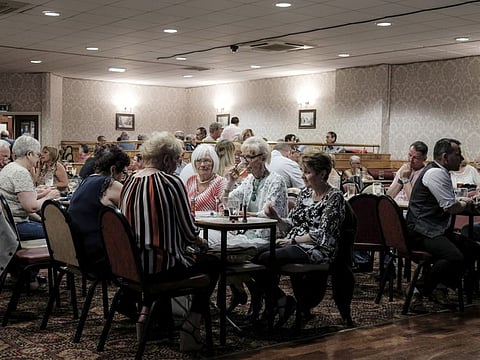Why is British life expectancy falling?
Poor diet, obesity, smoking and a lack of exercise are taking their toll on the British

HARTLEPOOL, England - Britons are no longer living longer than before. Just ask Callum Hills.
His father died of a heart attack last year at age 52. Hills had found him stricken on the floor in the middle of the night, and today is still haunted by his memory.
“I keep having dreams, and he’s in them,” said Hills, a thoughtful and articulate 23-year-old.
For the first time in modern history, Britain’s gains in life expectancy have stalled - at 79.2 years for men and 82.9 years for women for the years 2015 to 2017. That is better than the United States, but Britain is slipping down the ranks in Western Europe.
In 1841, life expectancy in Britain was around 40 for men and 42 for women, and its rise through improvements in infant mortality, sanitation, nutrition and medical care became a symbol of progress. In recent times, the figures had generally improved by about three years every decade.
But no longer.
Alcohol and drug abuse, poor diet, obesity, smoking and a lack of exercise have taken their toll, increasing the risks of cancer, heart disease and diabetes. Older people are dying prematurely, their conditions worsened by isolation and depression, experts say.
Underlying many of the problems, they say, is the government’s austerity program, which was instituted after the 2008 financial crisis and has eaten away at funding for social programs, transportation and other things that might counter the negative trends.
Things have probably not been helped by the chaos in Parliament over Brexit, which has forestalled efforts to come to grips with the growing problems.
While the rate of improvement in life expectancy had long slowed, “2010 marked a turning point in long-term mortality trend,” according to the King’s Fund, a health research institute. Across the country, mortality rates in the first few months of 2018 were higher than in any quarter since 2009.
Among British cities, Hartlepool (pronounced HART-lee-pool), a proud seafaring and manufacturing town battered by deindustrialisation, has suffered one of the largest drops in life expectancy. It has the second-highest stroke rate in its region, its death rate tied to drug abuse recently tripled, and its smoking rates are much higher than the national average. Statistics on deaths from cancer and cardiovascular, liver and respiratory disease are troubling.
The average life expectancy for men in Hartlepool was 76 years and one month from 2015 to 2017, fully 18 months less than in 2011-13. For women, the figure of 81 years and four months ticked up slightly in the most recent set of statistics but is still lower than it was in 2011-13 or 2013-15.
Nobody eats fruit in this town
The 2010 turning point in mortality statistics coincided with the aftermath of the financial crisis, as Britain reined in public spending.
Danny Dorling, a professor of geography at Oxford University, argues that “the link with austerity is not easy to correlate, but it is incredibly strong.”
Hartlepool’s representative in Parliament, Mike Hill, agrees. “There is no doubt that austerity has hit Hartlepool, and that there is a connection with life expectancy,” said Hill, a member of the opposition Labour Party.
Fewer than half of Hartlepool’s residents eat the recommended portions of fruits and vegetables, and fruit consumption ranks among the lowest in England. This partly reflects lifestyle choices: popular fast food meals include options like the “parmo” - breaded, deep-fried chicken covered in bechamel sauce and Parmesan cheese - that pack as much as 2,000 calories.
But healthy food is often more expensive than calorific processed meals.
‘I want to live past 50’
At the help and advice center of the Oxford Road Baptist Church, Ian Jennings, 47, remembers eating fresh vegetables from his father’s garden as a child. “I have been trying to get healthier; I do know I am overweight,” he said. “What people will do, because they haven’t got the money, they think I’ll go out and buy fish cake and chips or kebab.”
Austerity has also had an effect on younger people. The Belle Vue community sports and youth center has impressive facilities, but after losing about a third of its funding and around half of its full- and part-time staff, it can no longer offer a program for children with behavioural problems. A proposal to encourage and organise sports at 19 local schools has been axed.
“These are the things that keep young people from anti-social behavior,” said Alan Clark, who attended the center as a 5-year-old and is now the chairman of its board of trustees. Under austerity, he added, “the social fabric of the nation is being destroyed.”
Community spirit nonetheless remains strong in Hartlepool, and Hills was overwhelmed when local people raised more than 2,000 pounds for his father’s funeral.
Hills looks fit, is a member of a running club, has a job as a youth worker and is trying to give up smoking. But one of his aunts also died prematurely, at 40, and he thinks it would be better to move away.
“I need to leave,” he said, “because I want to live past 50.”
The New York Times News Service



